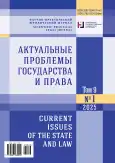Problems of restricting the rights and freedoms of foreign citizens in the constituent entities of the Russian Federation
- Authors: Karpushkin A.V.1
-
Affiliations:
- Penza State University
- Issue: Vol 9, No 1 (2025)
- Pages: 86-92
- Section: Issues of Private and Public Law
- URL: https://bakhtiniada.ru/2587-9340/article/view/295229
- ID: 295229
Cite item
Full Text
Abstract
The analysis of the problems of legal regulation of restrictions on the rights of foreign citizens by normative act of the heads of the constituent entities of the Russian Federation is carried out. In recent years, a number of constituent entities of the Russian Federation have adopted acts restricting the employment of foreign citizens in certain areas, despite the fact that articles 55 and 62 of the Constitution of the Russian Federation provide for restrictions on rights and freedoms only by federal law. In this regard, the purpose of the study is to clarify the constitutionality of these restrictions at the level of the constituent entities of the Russian Federation. To achieve this goal, the tasks of analyzing the norms of the Constitution of the Russian Federation, federal and regional legislation were solved using general scientific and special legal research methods. The main conclusions are the establishment of a framework for certain norms of federal legislation and the presence of indirect restrictions on the rights of foreign citizens through the introduction of bans on their employment by business entities, which, from a formal and legal point of view, does not contradict the Constitution of the Russian Federation. The theoretical conclusions of the study can be used in the development of regulatory and legal regulation in similar areas of application related to the restriction of citizens’ rights.
About the authors
Alexey V. Karpushkin
Penza State University
Author for correspondence.
Email: kistin.sergei@yandex.ru
ORCID iD: 0009-0000-8870-7788
Cand. Sci. (Law), Associate Professor of State Legal Disciplines Department
Russian Federation, 40 Krasnaya St., Penza, 440026, Russian FederationReferences
- Lebedeva E.A. (2024). Administrative and legal mechanisms of ensuring the safety of migration processes. Vestnik universiteta imeni O.E. Kutafina (MGYuA) = Courier of the Kutafin Moscow State Law University (MSAL), no. 5 (117), pp. 192-198. (In Russ.) https://doi.org/10.17803/2311-5998.2024.117.5.192-198, https://elibrary.ru/cumkoa
- Foigel’ E.I. (2024). Some aspects of criminalistic support of the migration security of the Russian Federation. Vserossiiskii kriminologicheskii zhurnal = Russian Journal of Criminology, vol. 18, no. 2, pp. 200-209. (In Russ.) https://doi.org/10.17150/2500-4255.2024.18(2).200-209, https://elibrary.ru/mamsjh
- Goncharov D.Yu., Goncharova S.G. (2021). Public danger fictitious migration registration foreign citizens or stateless persons. Pravoporyadok: istoriya, teoriya, praktika = Legal Order: History, Theory, Practice, no. 3 (30), pp. 56-59. (In Russ.) https://elibrary.ru/avggmx
- Gadzhimuradov Sh.A. (2023). Modern assessment of the state of migration crime. Vestnik Moskovskogo universiteta MVD Rossii = Vestnik of Moscow University of the Ministry of Internal Affairs of Russia, no. 1, pp. 73-79. (In Russ.) https://doi.org/10.24412/2073-0454-2023-1-73-79, https://elibrary.ru/uhtwpx
- Reshnyak M.G (2023). Migration as destabilizing factor of national and international security. Vestnik Vostochno-Sibirskogo instituta MVD Rossii = Vestnik Eastern Siberia Institute of the Ministry of the Interior of the Russian Federation, no. 2 (105), pp. 243-255. (In Russ.) https://doi.org/10.55001/2312-3184.2023.31.60.021, https://elibrary.ru/woxprl
- Lur’e A.A. (2023). labor migration and the Russian labor market. Sotsiologiya = Sociologу, no. 2, pp. 49-52. (In Russ.) https://elibrary.ru/vrmciu
- Bulatov T.R. (2024). The legal status of foreign citizens in the Russian federation: the concept and features. Zakon i pravo = Law and Legislation, no. 2, pp. 49-52. (In Russ.) https://doi.org/10.24412/2073-3313-2024-2-49-52, https://elibrary.ru/uktqhp
- Prudnikova T.A. (2019). Experience of foreign countries in regulating migration processes. Vestnik ekonomicheskoi bezopasnosti = Vestnik of Economic Security, no. 4, pp. 255-258. (In Russ.) https://doi.org/10.24411/2414-3995-2019-10252, https://elibrary.ru/ahcfao
- Prudnikov A.S. (2024). Individual issues of improving measures to counter illegal migration. Obrazovanie. Nauka. Nauchnye kadry = Education. Science. Scientific Personnel, no. 1, pp. 119-122. (In Russ.) https://doi.org/10.24412/2073-3305-2024-1-119-122, https://elibrary.ru/qrmnpg
- Ispovednikov D.Yu. (2023). Economic and social consequences of the ban on the employment of foreign workers (example of the central federal district). Nauka. Kul’tura. Obshchestvo = Science. Culture. Society, vol. 29, no. 1, pp. 143-158. (In Russ.) https://doi.org/10.19181/nko.2023.29.1.11, https://elibrary.ru/jnmqtj
Supplementary files









